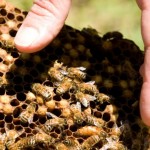Sugar Diet and Bee Health
URBANA, Ill. — Diets used in beekeeping may play a role in preventing the insects from staving off the effects of some pesticides, a new study suggests.The findings of the research, led by University of Illinois entomologist May Berenbaum, were recently published in the Proceedings of the National Academy of Science.
While bees in the wild feed on honey stored in the hive, those in commercial hives generally are fed a sugar solution after the honey is harvested. That may contribute to an inability to break down enzymes in pesticides.
“One thing we found is that the genetic response to pesticides in the diet is different, depending on whether the bees are eating honey or whether they’re eating sucrose or high fructose corn syrup,” Berenbaum said.
“That led us to wonder what it was in honey that is regulating the honeybee detoxification system. There are clearly components in honey that bees respond to by cranking up their systems for disposing of pesticides.”
The researchers identified specific components found in honey that turn on defense genes in the bees. Most active is the chemical p-coumaric acid, which is present within walls of pollen grains. Certain chemical components give animals — including humans — the ability to break down chemicals.
“Like bees, we use enzymes to break down poisons. Our liver breaks them down,” Berenbaum said. “Honeybees use their mid-gut like we use our liver. They need a signal to get activated, and the honey provides a signal for the enzymes to act.
“Honeybees that eat honey are better at breaking down pesticides than bees that eat sugar. The big surprise is not only do they turn on detoxification genes, they also can turn on some of the immunity genes.”
The use of pesticides — specifically neonicotinoids — has been suggested as a contributing factor of colony collapse disorder, a phenomenon of reduction in honeybee populations both in the U.S. and Europe, though the cause has not been scientifically established.
Regardless, a diet that impedes a honeybee’s ability to break down chemicals in poisons could have an effect on hive health, according to Berenbaum.
“One of the longstanding questions about bee health and bee decline was whether there’s an impact of feeding bees — particularly over the winter — not honey, which is what they naturally eat, but sugar substitutes,” she said. “Our results suggest that maybe it’s not such a good idea to feed bees only sugar substitutes because none of these sugar substitutes contain the components we found in honey that turn on the defense genes.
“We don’t even know if the bee decline we see today is the same thing as the bee decline in 2007, when it got the name colony collapse disorder. We don’t know if the bee decline in Europe is the same thing here in the United States.”
A decline in bee populations has implications far beyond those involved in apiculture. Honeybees pollinate a number of agriculture crops.
“In general, we know there are problems in apiculture,” Berenbaum said. “It’s really more productive to think about bee health than it is to worry about one specific manifestation of bee problems. Instead, focus on why we’re losing bees across the board.”
